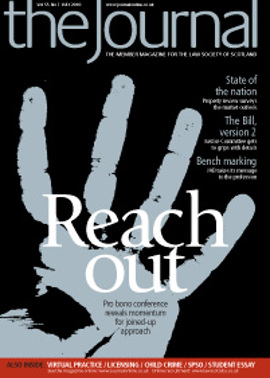Split decision

Family law judgments in Scotland making front page headlines are rare, and rarer still when they also form the subject of a debate on the Matthew Wright show on Channel 5.
But beneath the media take on Lord Woolman’s decision in PH v JK or H [2010] CSOH 32 as a judgment which would lead to siblings being brought up 12,000 miles apart, may just be detected a subtle shift in some of the orthodoxy which has shaped child law in Scotland. And not before time, some might argue.
Certainly, conventional wisdom dictated that a court would not make a decision to separate children, least of all where it meant an 11-year-old boy growing up in Melbourne with his father while his 13-year-old sister remained in Glasgow with her mother. In that respect, we will all now have to exercise caution in the advice we give clients in residence actions where the children’s views as to their future upbringing may differ.
Lord Woolman’s decision regarded the preservation of the sibling relationship as a central consideration, and referred to expert evidence which recognised that it is important for siblings to stay together to give mutual support after their parents’ separation. However, while acknowledging this, he accepted that children’s relationships with their parents are the primary ones and this formed an important counterweight.
Interestingly, there is research from the family court in Australia, which was not presented to the court, that challenges the accuracy of predictions of dire consequences of separating siblings after divorce. Indeed, the study suggests that adopting such an arrangement can sometimes foster co-operative parenting, insofar as both parents have a real motivation to make the arrangement work.
Within discretion
Central to the decision was that it was in accordance with the children’s own wishes. The decision was subject to an appeal to the Inner House (unreported at the time of writing), which was refused, but one of the grounds of appeal was that the Lord Ordinary had attached too much weight to the views of an 11-year-old.
Given that he was at the cusp of an age where his view would have had to be taken into account, and that he had been consistent in expressing his view, it was within the Lord Ordinary’s discretion to take that as one of the most significant factors in reaching a decision. To do otherwise would arguably have sent a signal that the views of an older sibling may prevail even where not in accordance with the views expressed by the younger sibling and where the age difference is not significant.
The case was also novel as being one of the first reported cases involving repatriation rather than relocation. Lost somewhere in much of the media reporting was the fact that this was an Australian family. The husband’s job had seen the family relocate to Scotland and that contract had been extended beyond the time originally envisaged. Nevertheless, his work in Scotland had come to an end and his employers were insisting he return to Australia. The family plan had always been to return to Australia where they had retained properties, the children were enrolled to attend a private school, and the parties’ extended family all lived. The support network of the extended family was one of the factors referred to in Lord Woolman’s opinion.
Parenting today
Yet it might be that the lasting impact of the case is as a redefining of the role of carer. While it was acknowledged that up until separation the parties had operated what might be viewed as traditional roles – the husband as breadwinner and wife as carer for the children – the father had combined a demanding job with spending as much time with the children as possible, in particular at the weekends but generally as often as possible trying to be home in the evenings to put the children to bed.
Post separation, the children had typically spent six nights out of 14 with the father (the daughter reducing that to four shortly after the commencement of proceedings), and the mother had reverted to full-time work. Lord Woolman rejected any suggestion that “one parent has a significantly different amount of time to spend with the children”. Again, this formed an element of the appeal grounds with the suggestion being that the Lord Ordinary had failed to give weight to the importance of maintaining the role of the mother as primary carer.
Given that the post-separation arrangements in recent times concerning the 11-year-old boy had been close to shared residence, this was a difficult idea to sustain. But perhaps it is also recognition that sometimes caring involves working and earning a living for the family, and that the parent, more typically the father, should not be penalised in a post-separation scenario for having taken on that role if they are then able to manage their work commitments in such a way as to allow for shared care to be a feasible proposition. (Indeed in Australia there is a rebuttable presumption of equal shared care.)
The jurisprudence of Scots child law remains comparatively bereft. The test of what is in a child’s best interests allows for an exercise of discretion and with it an element of judicial weighting which inevitably allows for societal conventions and personal prejudices to shape the law and dictate the boundaries beyond which courts could be expected not to stray. Perhaps the demographics of child law litigation occurring in front of largely male judges whose own experiences of parenting were maybe a generation behind the modern concept of fatherhood, had the result that the decisions of the courts in the past often took a narrow view of the definition of caring for children.
As family dynamics change, with parents working flexible hours or job sharing and the care of children as a result often being in the hands of both parents (and perhaps grandparents too), the decision of Lord Woolman is a welcome recognition that every case should truly be treated on its own merits and the old presumptions about caring for children no longer apply.
- Roger Mackenzie is a solicitor in the family law unit at Maclay Murray & Spens who acted for the father in PH v JK or H.
In this issue
- Drop everything
- Free to give
- For the common good
- "Not for the likes of me"?
- RoS fees up for review
- Taking shape
- Criminalising children
- Split decision
- A picture's worth a thousand words
- "Duty to trade" revisited
- Law reform update
- From the Brussels office
- Join the cloud
- Combating claims in interesting times
- Ask Ash
- Party confidential
- What fresh hell is this?
- Links with the past
- Stranger than fiction
- Acts of kindness
- Scottish Solicitors' Discipline Tribunal
- Website review
- Book reviews
- Service driver
- Forecast: cloudy






